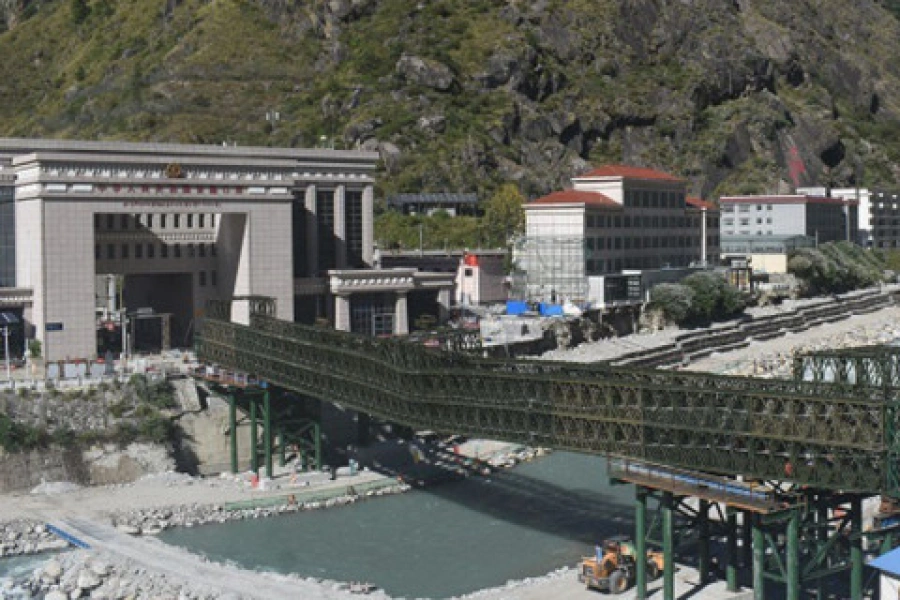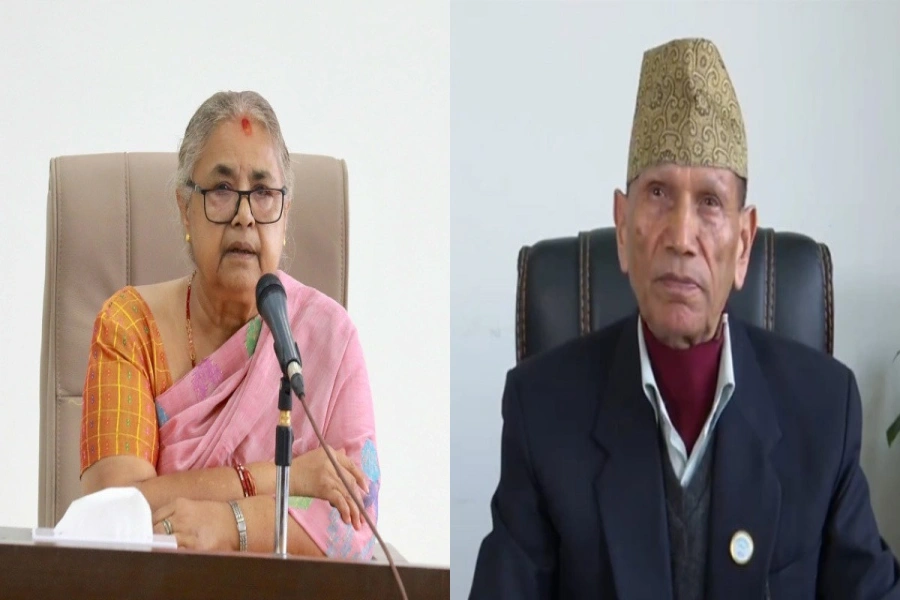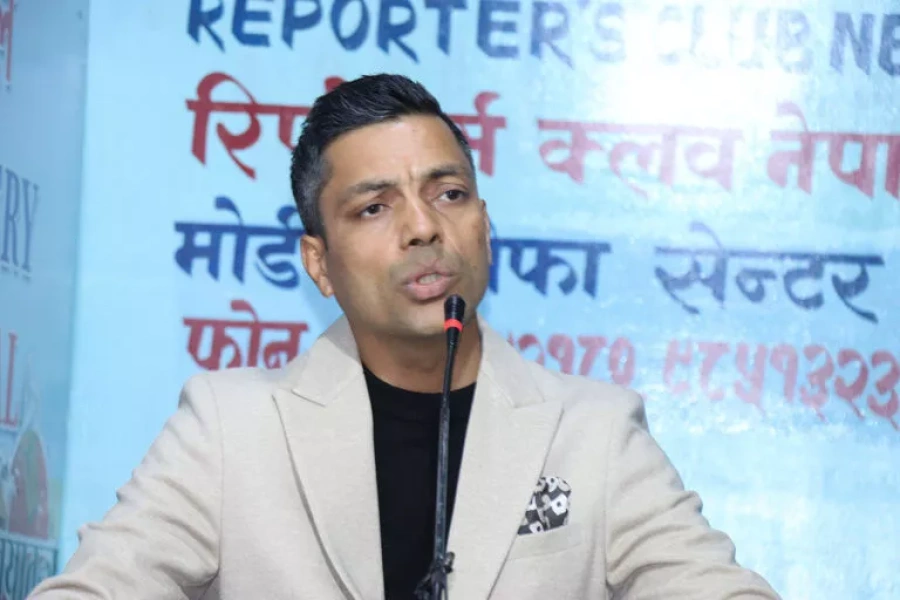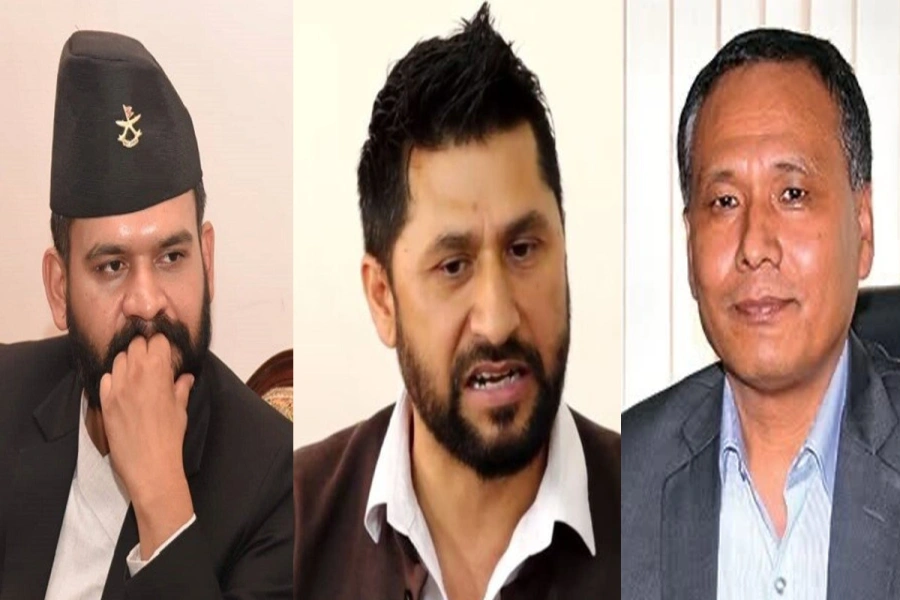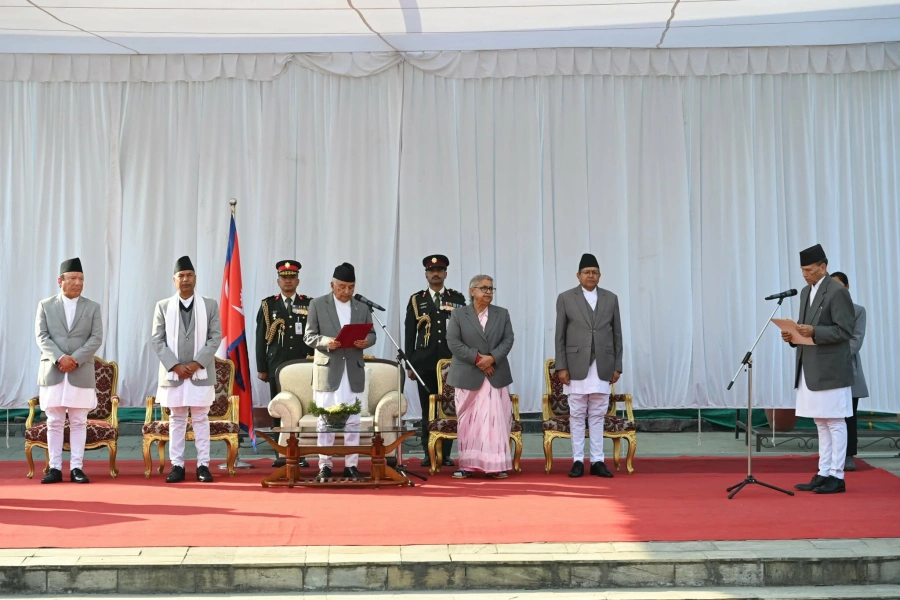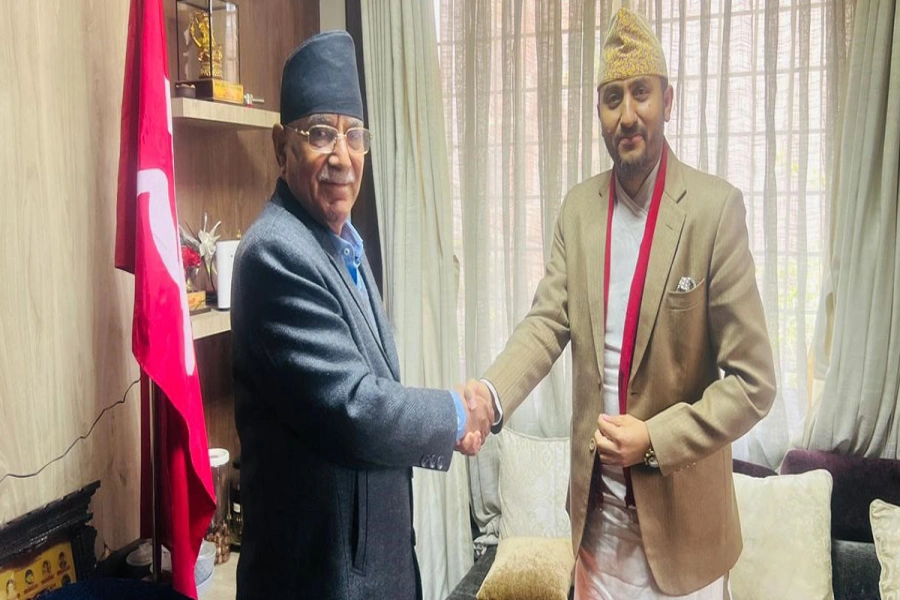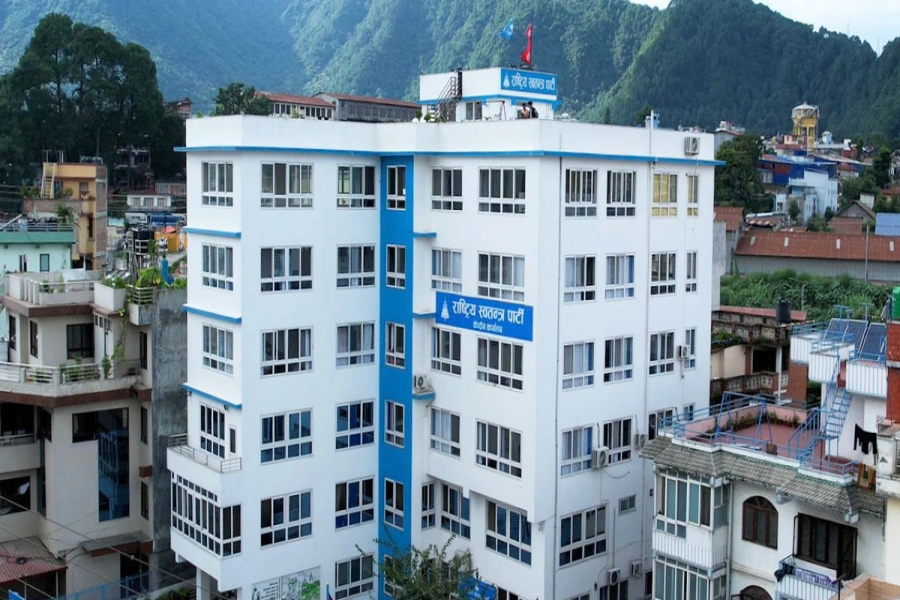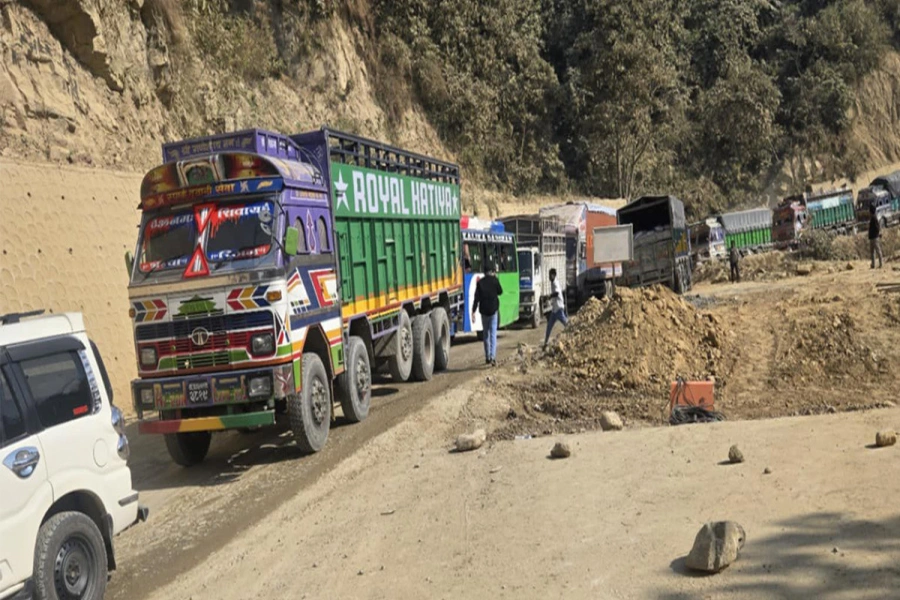True to the ideals of an advanced civilization, and having full faith in human values, handed down from Vedic wisdom, Nepali people have always tried to exist as a free and independent nation. Although the ancient history of Nepal provides glimpses of fighting during the earlier periods of Kirats and Lichhabis, Nepal's path to peace, reconciliation and harmony commenced with the birth of the Prince of Peace in Lumbini. Ever since the unification of Nepal by Prithvi Narayan Shah, threat started emerging from the South in the form of British colonists and from the North in the form of Tibet.But Nepal managed to remain free, independent and sovereign through great sacrifices of her illustrious ancestors. Throughout its modern history Nepal has always behaved as a good neighbor, trusted friend and a bastion of independence in South Asia. Nepal has fully adhered to the principles of its foreign policy as enunciated by King Prithvi Narayan Shah.
Nepal has always tried to live with India in peace and amity despite India's highhandedness and unnecessary interference in Nepal's internal affairs. Relations between Nepal and India, different in size and population, have been good mainly owing to Nepal's firm faith in peace and stability as the keystones to development. Despite India's breach of International Law in conduct of neighborly relations as well as infringement on five principles of peaceful coexistence, particularly non-interference in internal affairs of an independent and sovereign nation, Nepal has been patient and accommodative.
It has become a habit of India to meddle in internal affairs of Nepal under different pretexts—the current undeclared border closure is now challenging the duly promulgated constitution of Nepal. How can India or any other country challenge the constitution passed by a two-thirds majority of the Constituent Assembly?
India, which at one time was on the verge of selling all its gold reserves to support its foreign currency reserve and seeking support from weaker economies such as Nepal, has now emerged as a fast-growing economic power. Could India's arrogance emanating from its economic power have changed its civilized behavior, especially with its neighbors? It would do well to learn from past mistakes of countries stronger and more powerful than it is today.
The strongest and richest power in the world, the United States, had to rethink its decision of subjugating Vietnam with military might and withdraw. Nevertheless, in the process, it lost more than 50,000 American soldiers with many more missing in action. It is now assisting its one-time enemy Vietnam in its economic development. Why does not India learn from the United States as President Obama has lifted all sanctions imposed against Cuba some 50 years ago and is now cooperating with it for mutual peace, stability and economic development? It clearly shows that no nation can attain its full potential without peaceful and harmonious relation with its neighbors.
Nepal and India are inextricably linked by common cultures, religions and customs as well as interdependence in other spheres. They are two sovereign nations with close relations starting from Pauranic age. In Dwapar Yuga, Raghunandana Rama of Ayodhya married Janakinandini Sita of Janakpur and the cross-border marital tradition initiated by Nepal and India continues to this day. Lord Buddha who was born in Lumbini of Nepal got his enlightenment in Bodhgaya of India and spread the message of peace and compassion not only in these two countries but also throughout Asia. It is a pity for two such close countries to come to the present state.
Any rift in traditional relations between these two countries could be harmful to both. It does not augur well for Modi government to weaken its friendship with Nepal by imposing an undeclared embargo. This action comes at a time when Nepal is devastated by a huge earthquake and now almost pushed into a humanitarian crisis as people are deprived of essential commodities like fuel, food and medicine. Nepal also has to coexist with another contiguous neighbor China, bigger than India in size and population, on its northern side.
Nepal-China relations are also close, and even more fruitful. Nepal-China relations started with the marriage of Nepali princess Vrikuti to Tibetan King Shrong Tsen Gampo some 15 centuries ago. Along with the historic marriage, trade between them, though small-scale, began to grow and now has reached a stage where cooperation extends in every sector. Tibetan Autonomous Region of China has picked up growth, with China's massive resource contribution. It is right time to open a new chapter in Nepal-China relations in areas of trade and commerce as well as culture via Tibetan Autonomous Region to usher lasting relations on the basis of the five principles of peaceful coexistence.
China has been continuously supporting Nepal in its developmental efforts, first setting up a few factories producing paper, sugar, cloth, shoes and bricks and also a trolley bus from Kathmandu to Bhaktapur. This contribution to Nepal's modernization was hastily wiped out by those in power in the pretext of privatization, serving their narrow interests. Other projects like generating hydropower and construction of road, linking difficult districts—Arniko Highway and Rasuwaghadi Road—survived through support of local people. The wisdom of these people is vital to ease everyday pains imposed by current blockade.
Flow of fuel and gas in the form of Chinese grant, to be followed by commercial supply in near future, has given hope to Nepali people that they will survive this winter despite the cruel act of India. This should nudge the government and people of Nepal to ink lasting deal with China without hesitation. China has always treated Nepal as a sovereign and independent country and is prepared to deal with it in a dignified way, even though it has committed an error in Lipulekh. Otherwise, Chinese President Xi Jinping's assertion in the United Nations that every independent nation, big or small, is equal is meaningful. It is a statement from one of five permanent members of the United Nations Security Council in charge of maintaining global peace and security.
But it was startling to go through a joint British-Indian statement during recent Modi's visit to the United Kingdom. What could have prompted the constitution-less UK to dictate what to include in Nepali constitution formulated by duly elected people's representatives? It appears that the UK could never forget the humiliation at the hands of Nepali warriors when it tried to colonize Nepal. So a colonized India and at one time its lord Britain seem to be joining hands to coerce Nepal and deliver pain to patriotic Nepalis. If Britain has any courage left it should be prepared to scrap the Tripartite Agreement on Gurkha recruitment.
Britain's dream to colonize Nepal was unfulfilled and India's dream of securing a permanent seat at the UN Security Council is also fading. India is exposed as a violator of international conventions guaranteeing the access to sea of a landlocked country. Even the essence of Magna Carta seems tarnished with Britain's encouragement to India in its design to swallow up Nepal.
The people of Nepal should unite. People have shown unparalleled courage and determination on the face of acute shortage of essential commodities and necessary medicines. It is criminal on the part of violent protestors in border areas to vandalize, bomb and destroy essential medicines. Is this not an act of genocide of Nepali people? The world community can no longer remain silent spectator on face of the growing humanitarian crisis in Nepal. Or is it waiting for the death of thousands of innocent people of Nepal?
Prime Minister Oli could at least show some courage in defending and advancing Nepali sovereign right to carve out their own destiny by standing by an inclusive constitution and opening the door to its judicious amendments in coming days. His determination for the cause can be bolstered by his own political party and supported by coalition partners. Nepali Congress, though outside the ruling coalition, also cannot afford to pose obstacles to government at this critical juncture. Beware! All of Nepal is watching every leader, and each one of them will have to pay for their unpatriotic behavior and betrayal of our motherland.
The author is former prime minister of Nepal
The Do's and Dont's before buying a laptop



